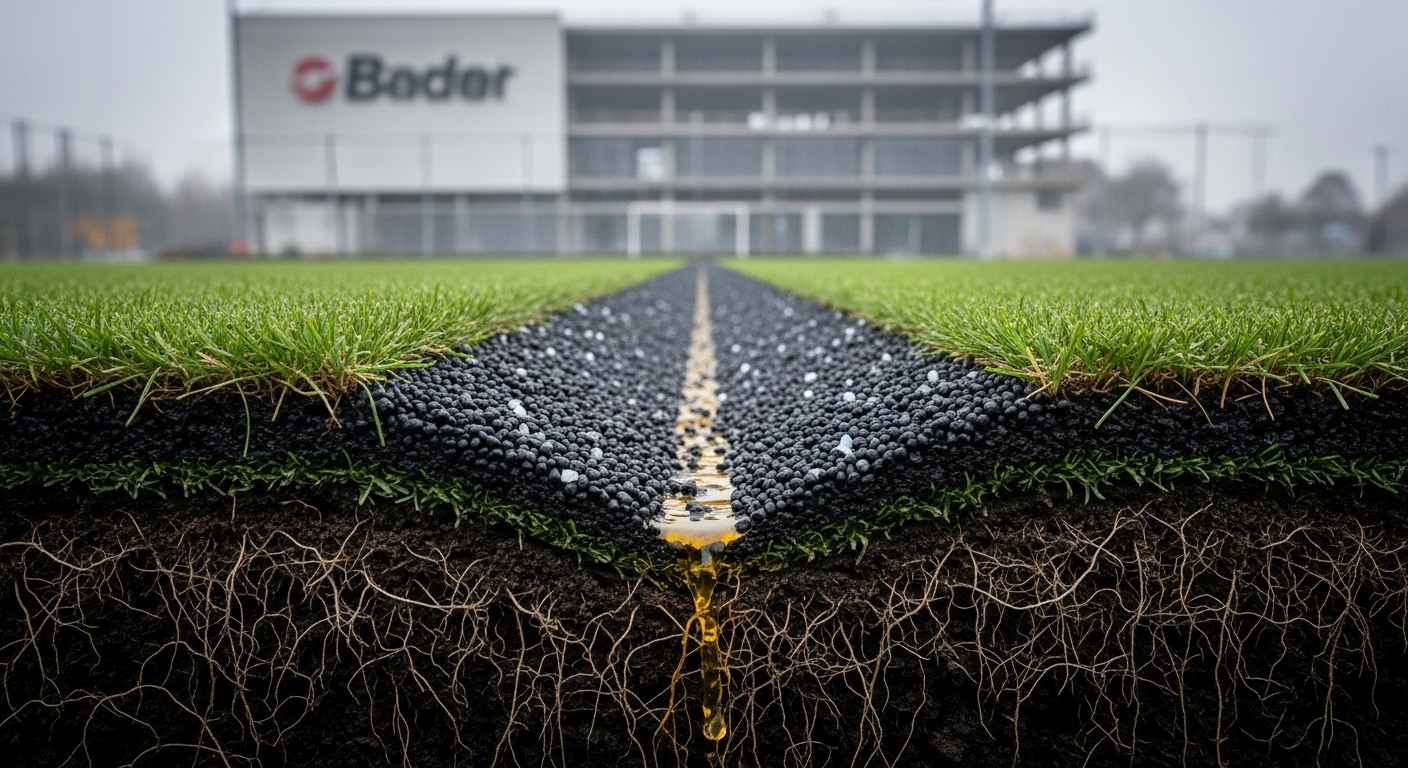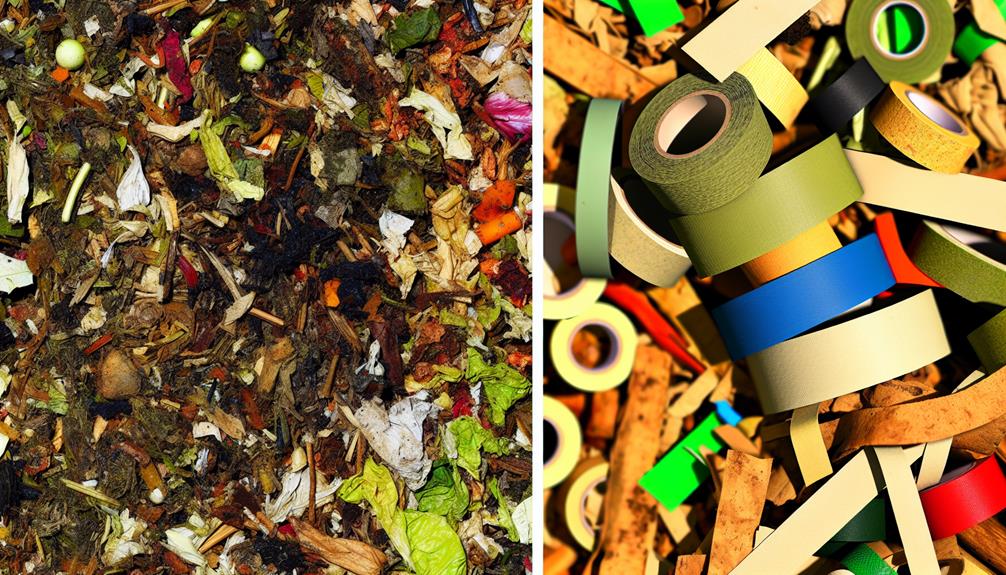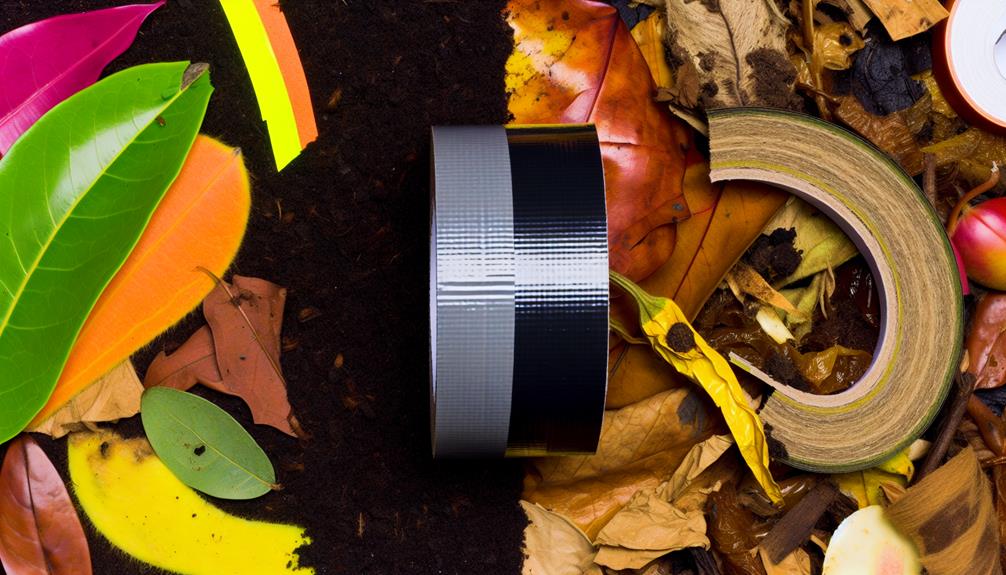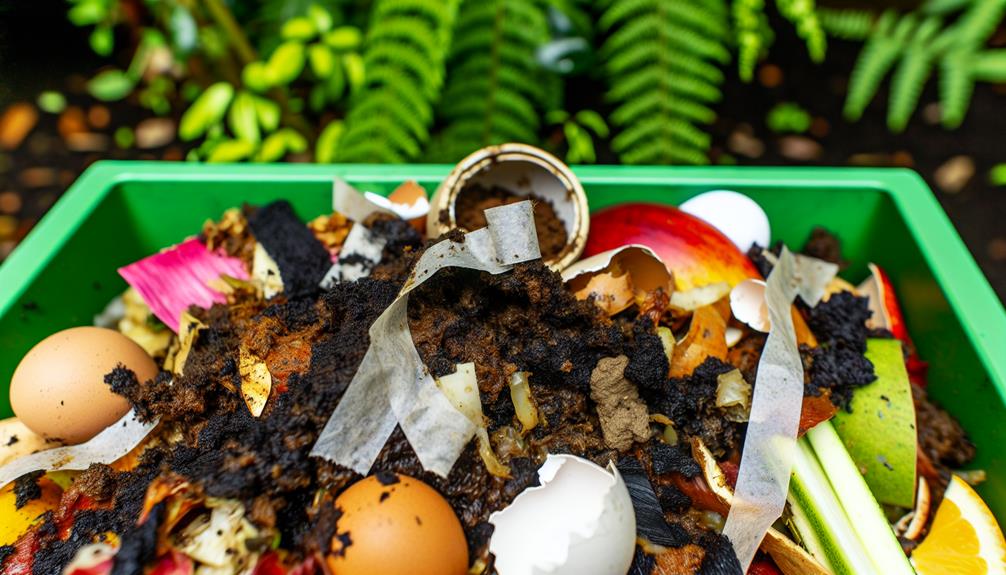

You can compost certain types of tape, like paper tape and washi tape, made from plant-based materials that break down naturally. These tapes are eco-friendly and support sustainable living practices. Cellulose and gummed tapes are also compostable, whereas traditional plastic tapes aren’t.
When composting, make sure to cut the tape into smaller pieces to accelerate decomposition. Avoid synthetic tapes, as they don’t decompose and contribute to landfill waste. Opting for compostable tapes helps reduce environmental impact and supports waste reduction efforts. Want to discover more about sustainable tape options and their benefits? Keep exploring to gain further insights.
When considering composting tape, one must understand the various types available. Knowing your options helps you choose the best tape for your needs, ensuring both adhesive strength and tape durability.
Traditional tapes often use synthetic materials that aren’t compostable, but newer, eco-friendly options are emerging.
First, there’s paper tape, which is popular due to its recyclability and compostability. It’s reinforced with natural fibers, providing decent adhesive strength and durability for everyday use.
Another option is cellulose tape, made from plant-based materials. It’s transparent and offers good adhesive strength, making it suitable for light packaging and office use.
For those requiring stronger adhesive strength and durability, consider gummed tape. When moistened, it forms a strong bond with cardboard and other surfaces. Though it’s typically used for heavier packaging, it’s still compostable due to its natural adhesive.
Lastly, washi tape, originating from Japan, is made from rice paper. While it’s not as strong as other tapes, its decorative appeal and compostability make it a favorite for arts and crafts.
Understanding the types of tape available sets the stage for exploring the benefits and applications of compostable tape. Compostable tape is designed to break down naturally, making it an eco-friendly alternative to traditional tapes. It’s usually made from materials like cellulose, which is derived from plant fibers. This type of tape can be a great addition to your composting efforts, especially if you’re keen on reducing waste.
When you’re incorporating compostable tape into your compost bin, follow a few essential composting tips. First, make sure the tape is clearly labeled as compostable. Not all tapes are created equal, and some might contain synthetic materials that won’t decompose.
Second, tear the tape into smaller pieces before adding it to your compost. This helps speed up the decomposition process. In urban composting, where space is limited, managing the breakdown of materials efficiently is vital.
Using compostable tape in your everyday life not only supports your composting goals but also fosters a sense of community and shared responsibility for the environment. By embracing these small changes, you join a growing group of people dedicated to sustainable living.
Also Read: Can You Compost Cat Food?
Unlike compostable tape, non-compostable tape is made from synthetic materials that don’t break down naturally. These materials, such as plastic and other polymers, are designed for durability and strong adhesive properties, making them ideal for packaging and everyday use. However, they pose significant challenges for waste management.

When handling non-compostable tape, it’s important to understand that it won’t decompose in your compost bin. Here’s why:
To manage waste effectively, you should separate non-compostable tape from compostable materials. Consider recycling options if available, as some recycling facilities accept tapes made from certain plastics.
Switching to paper tape can greatly improve your composting efforts. Paper tape is generally more eco-friendly than its plastic counterparts. Made from paper and a natural adhesive, it breaks down more easily in compost bins. However, you must be mindful of the adhesive residue. Some paper tapes use synthetic adhesives that don’t decompose well. To guarantee compostability, look for tapes labeled as biodegradable or compostable.
Using paper tape can also address recycling challenges. Unlike plastic tapes, which often need to be removed from cardboard before recycling, paper tape can stay on. This integration makes the recycling process smoother and more efficient. When you use paper tape, you’re not only making composting easier but also simplifying recycling.
To get the best results, remove any large pieces of tape from your compostable materials and cut the tape into smaller segments. This speeds up decomposition. Always check if the adhesive is plant-based, as synthetic adhesives can slow down the composting process.
When it comes to plastic tape, you’ll need to take into account its significant environmental impact. Unlike paper tape, plastic tape presents decomposition challenges, as it can take hundreds of years to break down.
It’s essential to understand these issues to make more sustainable choices.
Plastic tape plays a major role in environmental pollution due to its non-biodegradable nature. When you opt for plastic tape, you’re contributing to a cycle that has notable environmental repercussions. Producing plastic tape requires considerable energy consumption, adding to your carbon footprint.
Once used, this tape often ends up in landfills, taking up valuable landfill space that could otherwise be utilized for biodegradable materials.
Plastic tape doesn’t break down naturally, leading to long-term environmental issues. The presence of plastic tape in the environment contributes to:
Opting for plastic tape presents significant decomposition challenges that worsen its environmental impact. When you dispose of plastic tape, it doesn’t break down easily due to its synthetic materials. This means it can persist in the environment for many years.
Microbial activity, which is essential for the breakdown process of organic materials, has little effect on plastic tape. Microorganisms can’t effectively decompose the synthetic polymers, leading to prolonged environmental presence.
If you’re aiming for a more sustainable lifestyle, understanding these challenges is important. Plastic tape disrupts the composting process, contaminating your compost pile with non-biodegradable fragments. Over time, these fragments can break down into microplastics, which pose additional environmental hazards.
To mitigate these issues, consider alternatives like paper tape or other biodegradable options. These alternatives integrate seamlessly into the composting process, allowing microbial activity to effectively break them down.
When considering specialty tapes, you’ll find that biodegradable options are a great choice for reducing environmental impact. These tapes break down naturally, minimizing waste and pollution.
It’s important to know how these alternatives can help you make more eco-friendly decisions in your everyday tasks.
A variety of biodegradable tape options exist that cater specifically to those seeking eco-friendly alternatives. When choosing biodegradable tape, consider the adhesive composition and the use of natural fibers. These factors guarantee the tape can break down properly in composting conditions, reducing your environmental footprint.
Here are three popular types of biodegradable tape:
To make sure you’re selecting a truly biodegradable option, always check for certifications or specific compostable labels.
Considering the environmental impact of specialty tapes, it’s important to evaluate their entire lifecycle from production to disposal. Specialty tapes often contain synthetic materials and adhesives that aren’t biodegradable. These components contribute to environmental degradation, especially when they end up in landfills.
When you use these tapes, think about the waste management challenges they present. Many specialty tapes, such as duct tape and electrical tape, are made from materials like PVC or polyester. These materials don’t break down easily, leading to significant landfill contribution. They can take hundreds of years to decompose, releasing harmful chemicals into the soil and water systems over time.
To mitigate these impacts, you can explore alternatives such as biodegradable or recyclable tapes. These options reduce the strain on waste management systems and minimize landfill contribution. Additionally, consider reusing tapes when possible or opting for mechanical fasteners like clips and ties for certain projects.
Also Read: Can You Compost Broccoli?
Composting tape significantly reduces waste by breaking down into eco-friendly materials, helping to lessen your carbon footprint. With proper waste management, you can divert a significant amount of waste from landfills. This process not only decreases landfill contributions but also supports a more sustainable environment.

When you compost tape, you actively contribute to:
To properly dispose of compostable tape, make sure you add it to your compost bin or a local composting facility. This guarantees that the tape breaks down naturally, contributing to a healthier environment.
If you don’t have access to a compost bin, check if your community offers composting services. Many cities have drop-off points or curbside composting programs.
Tape recycling is another method, though it’s less common. Some specialized recycling centers accept certain types of tape, but you’ll need to verify with local facilities. It’s important to separate the tape from other recyclables to prevent contamination. Always research specific guidelines provided by your local recycling program.
Unfortunately, if neither composting nor tape recycling is an option, landfill disposal becomes the last resort. When disposing of non-compostable tape in a landfill, try to limit the amount you send. Landfills already face significant waste issues, and reducing your contribution helps mitigate the problem.
Also Read: Can You Compost Black-Eyed Peas?
For a more eco-friendly approach, you can explore various sustainable alternatives to traditional tape. Choosing the right adhesive choices can greatly reduce your environmental impact and align with your compost strategies.
Here are some options to explore:
By incorporating these sustainable adhesive choices, you contribute to a more eco-friendly lifestyle. Paper tape, for instance, can be disposed of with other compostable materials, enhancing your compost strategies. Similarly, washi and cellulose tapes break down naturally, reducing waste in landfills.
Transitioning to these alternatives may seem small, but collectively, such changes make a significant difference. Embrace these sustainable options to foster a sense of community and shared responsibility for our planet’s health.
Tape affects the composting process by slowing down microbial activity and reducing the decomposition rate. If you want to keep your compost healthy and efficient, it’s best to exclude tape from your compost pile.
You might face health risks when composting tape due to toxic chemicals and microplastic contamination. These elements can leach into your compost, potentially harming your garden and community. Stick to compostable materials to guarantee safety.
When considering tape residue, you might worry about its impact on plants or soil quality. If the adhesive ingredients aren’t natural and the tape lacks biodegradability, it can potentially harm your garden community.
You’ll notice the tape discoloration and adhesive breakdown as signs that tape is decomposing in compost. Stick together with fellow composters by sharing these observations and ensuring your compost stays healthy and effective.
You’re wondering about decomposition rates for compostable tape. Typically, it takes around 90 days to break down, depending on conditions. Using compostable tape reduces environmental impact, making you part of a greener community.
When deciding whether to compost tape, always check its material. Compostable tapes, like those made from paper or plant-based materials, are safe for composting.
Avoid composting plastic and specialty tapes, as they contain non-biodegradable components. For a more sustainable option, consider using paper tape, which is often compostable and eco-friendly.
Proper disposal and choosing green alternatives can greatly reduce your environmental footprint. Always read labels to confirm you’re making the best choice for the environment.
